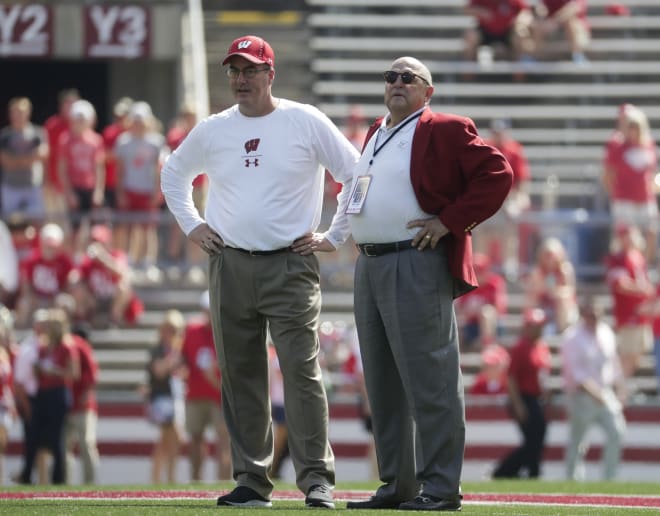Five takeaways from a virtual meeting with athletic director Barry Alvarez
Wisconsin athletic director Barry Alvarez spoke with media members for roughly 20 minutes Tuesday afternoon after the Big Ten announced the 2020-21 fall sports season was canceled.
Here are five takeaways from that virtual conversation.
RELATED: Big Ten Conference Cancels Fall Football | What Big Ten's cancellation of 2020 football means to recruiting |
PLAYING FOOTBALL IN THE SPRING

Tuesday, the Big Ten announced the 2020-21 fall sports season, including all regular-season contests and Big Ten Championships and Tournaments, was postponed due to "ongoing health and safety concerns related to the COVID-19 pandemic," according to a conference release.
The possibility of competition in the spring remains on the table, though the specifics have yet to be hashed out.
"I go back to Paul (Chryst) as a resource," Alvarez told reporters Tuesday afternoon. "I don't know anyone else who played spring football in a season who coached it. Paul coached it as young coach with one of those USFL teams to a full season and a number of those guys, apparently, went on to play in the NFL another full season."
Two full seasons in the spring (2021) and the following fall isn't possible, according to Alvarez.
"It wouldn't be two full seasons," he said.
"Two full seasons back-to-back like that is too much," Alvarez added. "Taking that into consideration, my natural thinking is six to eight games, something like that, if you do something in the spring."
This fall, student athletes will be able to work with coaches for up to 20 hours a week in preparation for a potential season.
"They've got 20 hours a week available to the coaches," Alvarez said. "That was one thing that I supported as we talked within the league, with other administrators. I thought that it was important that our coaches stay in contact with our student athletes. That they have some type of workouts with them, whether it be skill workouts or weight workouts, whatever they may be, just for the mental health of our student athletes to keep them active and that they have constant contact with their coaches. And that's for all fall sports."
MAKING CUTS AND ELIMINATING SPORTS
Prior the season being shut down, Alvarez said the UW athletic department was expecting an approximate $100 million budget shortfall. Additional cuts will have to be made, but maintaining the current programs within the department is a top priority.
"That's the one thing - and I'll be honest with you - that's the one thing we have not discussed," Alvarez said. "I will try and get through this without eliminating sports."
"We'll have to go through some more cuts," Alvarez added. "We've set up several budgets as we've went into this year, some for playing football, some with a partial stadium, some with no fans in the stadium and some with no football. We'll have to answer that and we do have a reserve that will take us so far. But we're going to have to have some layoffs.
"Some of our units that won't be working, those are things that we'll have a plan for. Those are very difficult decisions to make. We've had furloughs and we've tried to be as fair and take care of our people as best we could. But when you shut down and you're not playing sports - you lose the TV revenue and the gate - you have to make up for it somehow."
Wisconsin, though, will certainly not be alone in this financial situation.
"Every athletic department in the country is going to go through the same thing," Alvarez said.
TOP QUESTION MOVING FOWARD: ELIGIBILITY
During separate calls with Alvarez and Chryst, each said the top question players have moving forward is eligibility. That will be discussed in more depth Wednesday, according to Alvarez.
"My meeting tomorrow is going to be a lot about eligibility," he said. "We've had some discussion about it but not really in-depth study. We'll start that in earnest tomorrow, talking eligibility and that type of thing. The spring season hasn't even really been discussed, so how many games it would be to count towards eligibility ... If you only play a short season, is it worth a year of eligibility?
"I know how much our student athletes want to play and enjoy playing. I watched them practice the last couple weeks. Just watching them on the field and watching the coaches and how they interact and enjoy it, you just don't feel good about it. I don't feel good about the whole thing - I just feel a hollow feeling. This is probably going to be the toughest fall I've ever gone through."
PLAYING FOOTBALL OUTSIDE OF THE BIG TEN IN THE FALL
Big Ten commissioner Kevin Warren declined to answer if Tuesday’s decision to postpone football and other fall sports was unanimous. A statement co-signed by Nebraska chancellor Ronnie Green, athletic director Bill Moos, football coach Scott Frost and university system president Ted Carter stated "we have been and continue to be ready to play.” The SEC, Big 12 and ACC have yet to cancel its fall seasons.
"I just heard a little bit about that, that Coach Frost talked about maybe looking into playing some outside games," Alvarez said. "I don't know ramifications for any one of us who have signed off our media rights to the Big Ten.
"I've been a legitimate member of this league for a long time - since 1979, other than three years at Notre Dame - and I've never thought about trying to buck the Big Ten. I don't know all those answers but I'm guessing we're going to get them pretty quick."
WISCONSIN LEANED ON MEDICAL PROFESSIONALS
According to Alvarez, player safety was the top concern during the entire fall football debate. UW used a number of resources, specifically in testing procedures, but time ran out and a decision was made.
"We leaned on our medical professionals," Alvarez said. "We had a medical task force and we kept going back to them. We leaned on our local doctors, University Hospital, and we worked in conjunction with a group here that is working on a saliva test that gives us quick results. Our football team has even been involved in their testing, taking their test in conjunction with a nose swab. We thought that could potentially be an answer for us. If we had a saliva test that we could get back within an hour, we could have our guys do their test, have their breakfast and then have an answer before they went to practice. And we could guarantee a clean practice field. We just couldn't move it fast enough."
Money in regards to testing, though, was never a hurdle.
"Cost never came up," Alvarez said. "We were going to handle that and that was never an issue."
